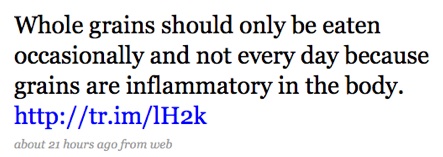Share This
I was poking around Twitter today (because I may or may not be addicted) when I noticed that someone had tweeted the above message. To everyone on the world wide web: this is simply not true. Refined grains tend to promote inflammation, while whole grains REDUCE inflammation. Here are some clips from the Whole Grains Council website to help back me up on this:
- High Fiber Diet cuts Inflammation Levels — C-reactive protein (CRP), a known marker for inflammation, is increasingly accepted as a good predictor of both type 2 diabetes and cardiovascular disease. A high-fiber diet – whether from foods like whole grains, fruits and vegetables or from fiber supplements – can cut CRP levels up to 40%. Ironically, the effect was more pronounced in healthy lean people than in obese ones, according to lead researcher Dana King at the Medical University of South Carolina. (Archives of Internal Medicine, March 2007; 12;167(5):502-6)
- Gum Disease Risk Reduced with Whole Grains — the risk of periodontitis, a serious inflammation of the gums that is the major cause of tooth loss in adults, may be reduced by eating more whole grains. Anwar Merchant and colleagues at McMaster University in Ontario studied more than 34,000 men over a 14-year period, and concluded that three to four servings of whole grains daily “may be optimal to reduce periodontitis risk.” (Am. Journal of Clinical Nutrition, June 2006; vol 83(6):1395-1400)
- Whole Grains Reduce Inflammatory Disease Risk — that habitual whole grain consumption reduces the risk of both cardiovascular disease and diabetes has been well documented. Now, a recent study by the University of Minnesota’s David Jacobs shows that eating whole grains confers an even greater risk-reduction in mortality from inflammatory diseases. Jacobs and his colleagues followed more than 27,000 post-menopausal women for 17 years and concluded that “oxidative stress reduction by constituents of whole grain is a likely mechanism for the protective effect.” (Am. Journal of Clinical Nutrition, June 2007; vol 85(6):1606-1614)


Add a Comment